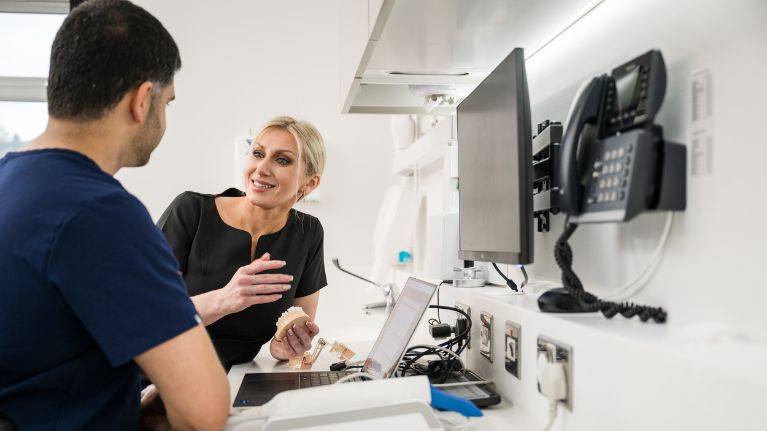Mentoring

We are delighted to announce the launch of our enhanced mentoring scheme, developed in collaboration with CGDent and ITI. This new program is designed to provide robust support and guidance to all members of the ADI community, ensuring you have the resources and mentorship needed to excel in implant dentistry.
Download the guidelines in full here: Mentoring in Implant Dentistry: Good Practice Guidelines
Special Offer for ADI Members
We are offering a 20% discount on the £400 registration fee for those who wish to become a registered mentor. Don’t miss this opportunity to enhance your professional journey and contribute to the growth of implant dentistry. Searching the mentor database is free to all.
How to Get Involved
- Register as a Mentor: Join the Register of Mentors in Implant Dentistry and make a lasting impact on the profession.
- Seek a Mentor: Connect with experienced professionals who can guide you through your career.
Invest in your future and the future of implant dentistry by participating in this transformative program. Whether you’re seeking guidance or ready to share your expertise, our mentoring scheme is here to support you every step of the way.
What Is Mentoring?
One definition of mentoring comes from the Standing Committee on Postgraduate Medical and Dental Education (SCOPME) report of 1998. The report defined mentoring as ‘a process whereby an experienced, highly regarded person (the mentor) guides another individual (the mentee) in the development and examination of their own ideas, learning, and personal and professional development’.
Because the purpose of the CGDent/ADI guidelines is to assist a practitioner in developing specific clinical skills, we are defining mentoring as a process whereby a dentist undertaking training in implant dentistry (the mentee) is guided by a suitably trained and experienced practitioner (the mentor) to develop the clinical skills required to carry out implant dentistry, as well as an exploration of the mentee’s ideas and learning.
The mentoring process will be an essential part of the overall training that is required to gain competency in carrying out implant dentistry. We recognise some overlap in this document between the terms ‘mentoring’, ‘teaching’, ‘training’ and ‘coaching’.
Why Is Mentoring Required In Implant Dentistry?
The CGDent and the ADI advocate that mentoring is an essential part of the development and training of every dentist who wishes to practice implant dentistry. It is considered good practice to seek a mentor to improve one’s skills, and to act as a mentor to take further responsibility and to help less experienced colleagues. The extent and nature of the mentoring relationship will depend upon the baseline level of competency of the mentee and the level to which they wish to aspire.
It is usually expected that the skills and knowledge necessary for competence in any new technique should be developed by the trainee through the following path, as outlined in Training Standards in Implant Dentistry:
- Attending an appropriate training course
- Undergoing a process of mentoring
- Having documentary evidence of training, including a logbook of clinical activity
The process of mentoring helps both mentor and mentee develop new approaches and skills and provides an opportunity for reflection on the work and treatment provided. Mentoring consolidates professional standards and values, which improves delivery of patient care and safety
Why Seek a Mentor?
Having a mentor can be a transformative experience, offering you:
- Personalised Guidance: Receive tailored advice and support from experienced professionals.
- Enhanced Learning: Gain insights into best practices, new techniques, and innovative approaches in implant dentistry.
- Career Growth: Navigate your career path with confidence and achieve your professional goals more effectively.
Why Become a Mentor?
As a mentor, you will have the opportunity to:
- Share Your Expertise: Guide and inspire the next generation of implant dentists.
- Professional Recognition: Be listed on the Register of recognised Mentors in Implant Dentistry, meeting rigorous standards of practice.
- Continuous Learning: Enhance your own knowledge and skills through the mentoring process.
The Mentoring Scheme
Our new scheme offers a comprehensive framework for both mentors and mentees, ensuring high standards of training and practice. The scheme includes:
- Rigorous Standards: Aligns with the Training Standards in Implant Dentistry (2016) and the Mentoring in Implant Dentistry: Good Practice Guidelines.
- Exclusive Access: Provides access to a network of highly qualified mentors.
- Support and Resources: Equips you with the tools and guidance needed for effective mentorship.
Mentoring in Implant Dentistry: Good Practice Guidelines
Training Standards in Implant Dentistry has been accepted by the GDC as outlining the training required by a dentist wishing to undertake implant dentistry. The document states:
‘Before undertaking implant treatment, a dentist must develop competence in the procedures involved in clinical assessment, treatment planning, and the placement and restoration of implants. The skills and knowledge necessary for competence should be developed through a training course in implant dentistry, with a suitably trained and experienced clinician acting as a mentor’.
The Mentoring in Implant Dentistry: Good Practice Guidelines are the product of a joint initiative between the College of General Dentistry (CGDent) and the Association of Dental Implantology (ADI). The purpose of this guidance is to provide a clear and practical pathway of the mentoring process for both mentor and mentee in the context of training in implant dentistry. This guidance outlines the aims and benefits of mentoring, describes skills and qualities appropriate in those wishing to become mentor and mentee, and provides an insight into the process of mentoring. It complements and supports Training Standards in Implant Dentistry.
These guidelines have been endorsed by:
- Association of British Academic Oral and Maxillofacial Surgeons (ABAOMS)
- British Association of Oral Surgeons (BAOS)
- Foundation for Oral Rehabilitation (FOR)
- International Team for Implantology, UK and Ireland Section (ITI)
- Platform for Exchange of Experience Research and Science, United Kingdom and Ireland (PEERS)